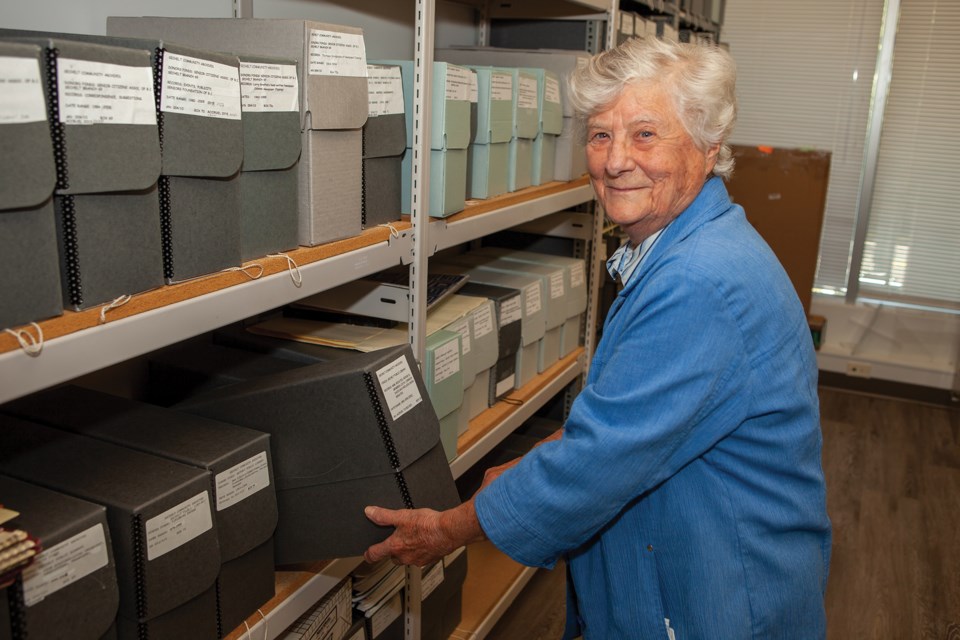The archivist who has spent more than a quarter-century preserving Sechelt’s past has been honoured for exceptional contributions to the understanding of British Columbia’s heritage.
Ann Watson became custodian of the Sechelt Community Archives at its inception in 1997. At a conference of heritage professionals held last month in Chilliwack, Watson received the Heritage BC Lifetime Achievement Award from the organization’s executive director, Kirstin Clausen.
“Ann Watson is a lifeforce for the heritage in her community,” said Britney Dack, Chair of Heritage BC. “Her transformation of the materials in Sechelt into a working archive is a testament to this dedication. Notably, Ann built digitization into the process, making the contents of the archive publicly available online.”
Watson, who marked her 90th birthday earlier this spring, immediately after the award ceremony on May 27 travelled to Vancouver Island to play a week’s worth of tennis matches. She returned to her office at the Sechelt Community Archives the following Thursday to supervise computer scanning of passenger manifests from historic coastal liners.
“Archiving is a rare skill,” Watson said, “and an even rarer appetite. There’s not that many of us around. But it’s an appetite that I myself have.”
Carrying a newly-minted master’s degree in history and geography, Watson emigrated from Dundee, Scotland to Ontario in 1958. She taught elementary schoolchildren across Canada — and in Zimbabwe, where her husband, an exploration geologist, worked in the 1970s. In 1986, she completed a diploma in public history at Simon Fraser University.
The community around the SFU campus presented an immediate opportunity. The Burnaby Historical Society engaged Watson to document heritage sites in the city’s fast-changing Metrotown neighbourhood. She later organized archival holdings at Vancouver’s Christ Church Cathedral and the Vancouver School of Theology, establishing policies and training volunteers in the process.
In 1997, the District of Sechelt opened its community archives and hired Watson to index the collection and process acquisitions. Its original extent was 30 metres of shelving packed with items accumulated by late librarian Helen Dawe. With the help of volunteers, Watson more than quadrupled the size of the collection. It now includes documents and photographs from more than 155 individuals and 31 local organizations.
“I think it’s the people that make Sechelt unique,” observed Watson. “When you look back at all these little coastal communities, whether it was logging or fishing or mining, they were only serviced by sea. It took a hardy group of people, especially the women, to come and put up with the conditions. And that’s so recent. That’s what I like about it. There are still people here who can remember the old days.”
The archives include materials from former shíshálh chief Stan Dixon, who died in 2019. He regularly visited Watson’s storehouse of records, and shared his perspective on reconciliation between Indigenous and non-Indigenous people. “He said we can look back a certain percentage of the time,” Watson recalled, “but we have to look forward. It’s what’s ahead that counts, really.”
Watson was nominated for the Lifetime Achievement Award by eight local heritage advocates, including Larry Penonzek, president of the Sunshine Coast Museum and Archives. “Her contributions to standardize collection policies and implement archival best practice has ensured that the Sechelt Archives operates to a standard not typically observed in small community archives,” Penonzek observed.
“She’s trusted with our community history,” added Matthew Lovegrove, curator and manager of the Sunshine Coast Museum and Archives. “She’s very lively and has got a wealth of knowledge. Even if they did digitize everything, you would still want to talk to Ann.”
Watson, while considering retirement in order to spend more time on the tennis and pickleball courts, maintains weekly office hours at the Sechelt Community Archives on Teredo Street. Since the start she has documented 1,310 research requests.
“Answers have been found for over 90 percent of the queries,” said Watson. “I find this one of the most interesting parts of being an archivist.”
The collection is accessible online at archives.sechelt.ca.





.jpg;w=120;h=80;mode=crop)